Mental Health: Collaborative Care Plan for Drug-Induced Psychosis
VerifiedAdded on 2023/06/12
|8
|2340
|452
Report
AI Summary
This report presents a comprehensive collaborative care plan developed for an 18-year-old Aboriginal female, identified as patient H, experiencing drug-induced psychosis resulting from methamphetamine use and polysubstance abuse. The care plan is consumer-focused and recovery-based, addressing the patient's goals, the role of significant others, and other identified priorities. It includes psycho-social strategies, nursing interventions, and biological interventions aimed at managing the psychosis and improving the patient's overall well-being. A critical review of the care experience from the patient's perspective is also provided, along with a reflection on the nurse's role in supporting the patient within the mental health setting. The plan emphasizes communication, reality-based thinking, and minimizing triggers for psychosis, ultimately aiming to rehabilitate the patient and improve their quality of life.
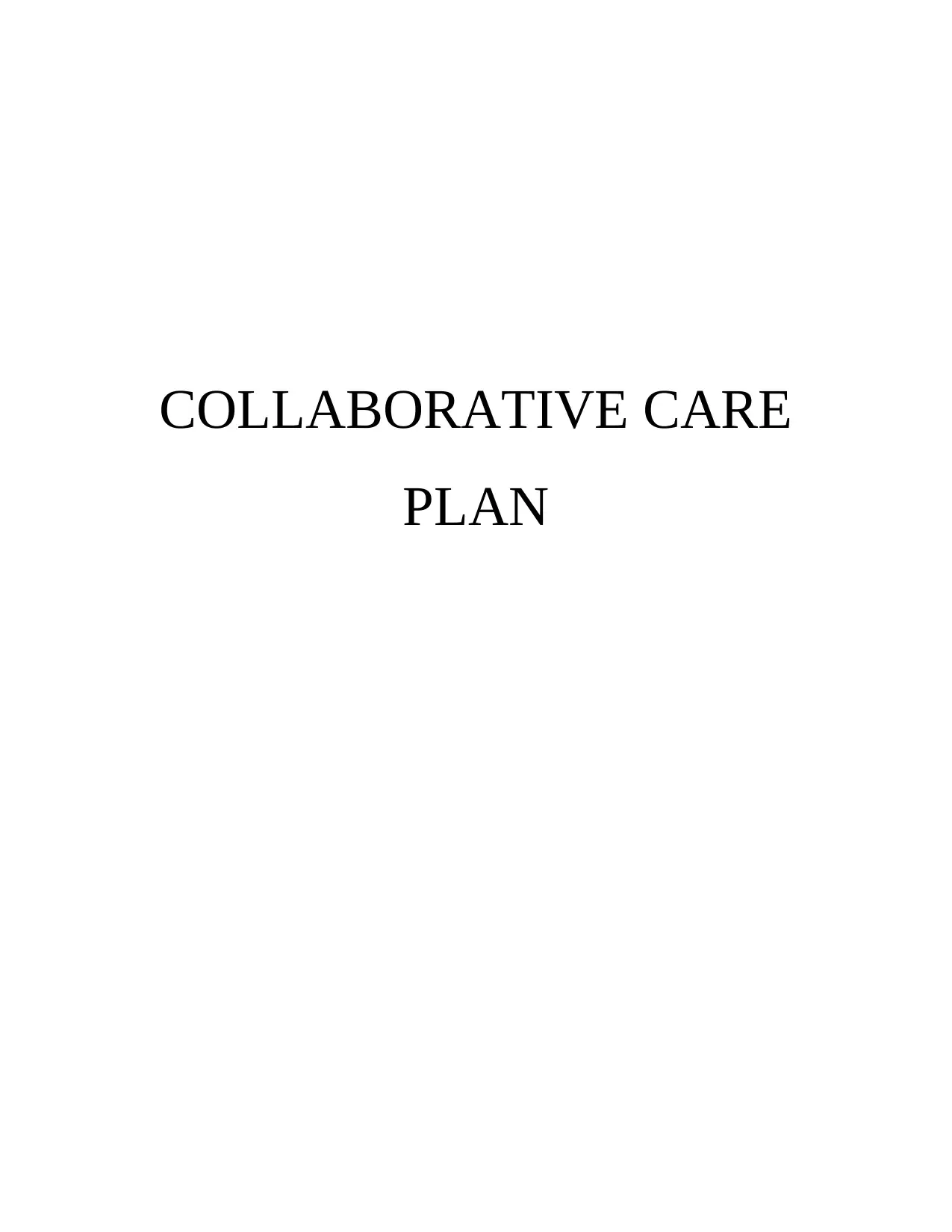
COLLABORATIVE CARE
PLAN
PLAN
Paraphrase This Document
Need a fresh take? Get an instant paraphrase of this document with our AI Paraphraser
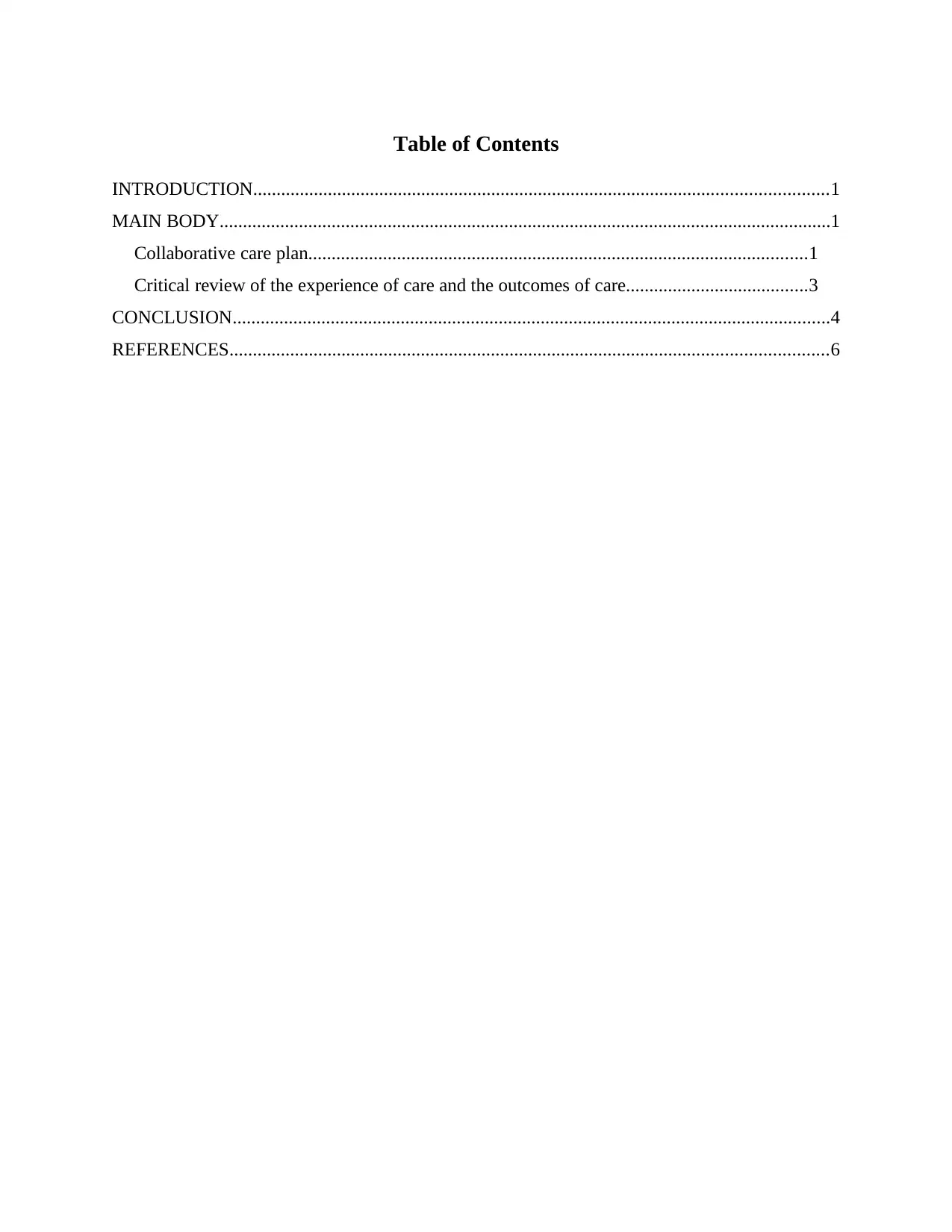
Table of Contents
INTRODUCTION...........................................................................................................................1
MAIN BODY...................................................................................................................................1
Collaborative care plan...........................................................................................................1
Critical review of the experience of care and the outcomes of care.......................................3
CONCLUSION................................................................................................................................4
REFERENCES................................................................................................................................6
INTRODUCTION...........................................................................................................................1
MAIN BODY...................................................................................................................................1
Collaborative care plan...........................................................................................................1
Critical review of the experience of care and the outcomes of care.......................................3
CONCLUSION................................................................................................................................4
REFERENCES................................................................................................................................6
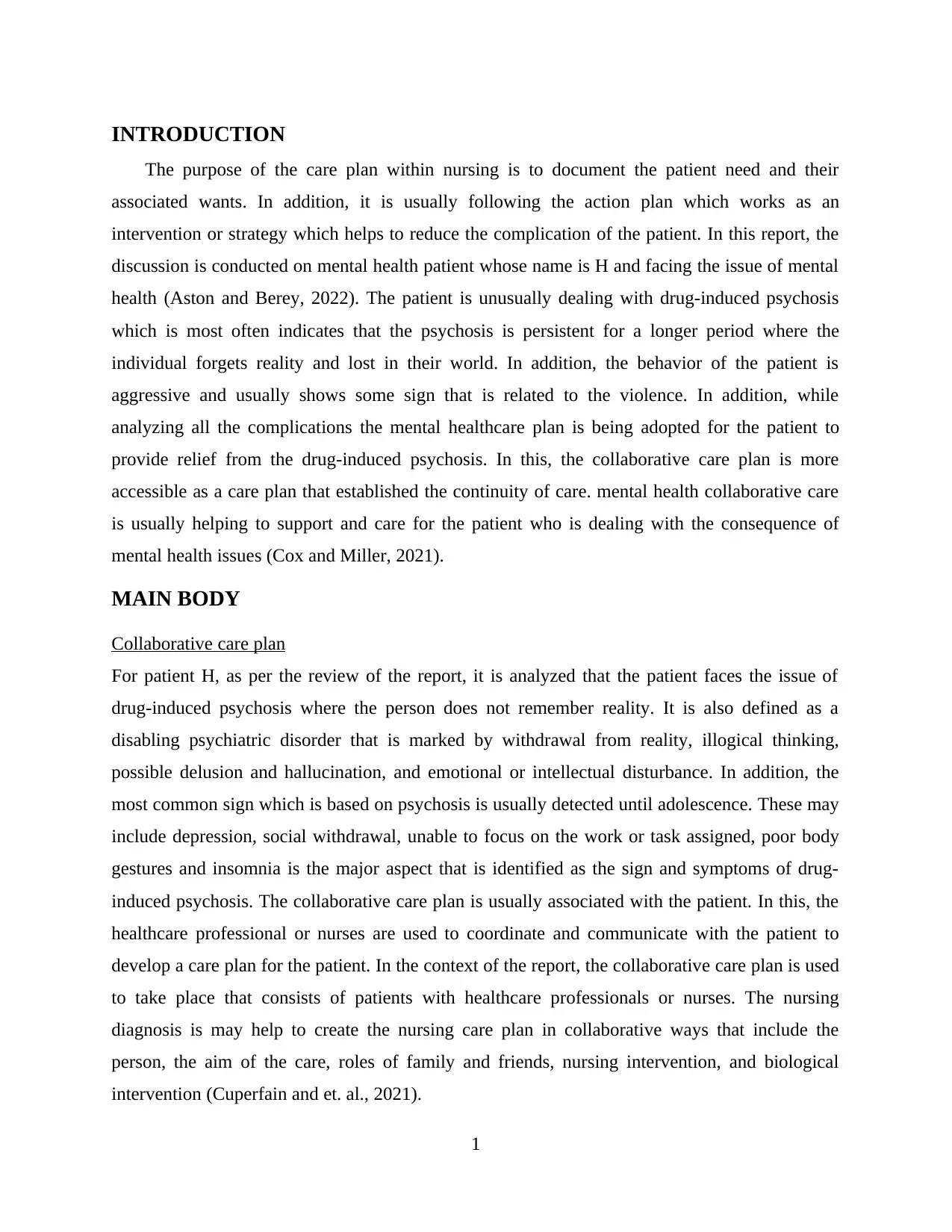
INTRODUCTION
The purpose of the care plan within nursing is to document the patient need and their
associated wants. In addition, it is usually following the action plan which works as an
intervention or strategy which helps to reduce the complication of the patient. In this report, the
discussion is conducted on mental health patient whose name is H and facing the issue of mental
health (Aston and Berey, 2022). The patient is unusually dealing with drug-induced psychosis
which is most often indicates that the psychosis is persistent for a longer period where the
individual forgets reality and lost in their world. In addition, the behavior of the patient is
aggressive and usually shows some sign that is related to the violence. In addition, while
analyzing all the complications the mental healthcare plan is being adopted for the patient to
provide relief from the drug-induced psychosis. In this, the collaborative care plan is more
accessible as a care plan that established the continuity of care. mental health collaborative care
is usually helping to support and care for the patient who is dealing with the consequence of
mental health issues (Cox and Miller, 2021).
MAIN BODY
Collaborative care plan
For patient H, as per the review of the report, it is analyzed that the patient faces the issue of
drug-induced psychosis where the person does not remember reality. It is also defined as a
disabling psychiatric disorder that is marked by withdrawal from reality, illogical thinking,
possible delusion and hallucination, and emotional or intellectual disturbance. In addition, the
most common sign which is based on psychosis is usually detected until adolescence. These may
include depression, social withdrawal, unable to focus on the work or task assigned, poor body
gestures and insomnia is the major aspect that is identified as the sign and symptoms of drug-
induced psychosis. The collaborative care plan is usually associated with the patient. In this, the
healthcare professional or nurses are used to coordinate and communicate with the patient to
develop a care plan for the patient. In the context of the report, the collaborative care plan is used
to take place that consists of patients with healthcare professionals or nurses. The nursing
diagnosis is may help to create the nursing care plan in collaborative ways that include the
person, the aim of the care, roles of family and friends, nursing intervention, and biological
intervention (Cuperfain and et. al., 2021).
1
The purpose of the care plan within nursing is to document the patient need and their
associated wants. In addition, it is usually following the action plan which works as an
intervention or strategy which helps to reduce the complication of the patient. In this report, the
discussion is conducted on mental health patient whose name is H and facing the issue of mental
health (Aston and Berey, 2022). The patient is unusually dealing with drug-induced psychosis
which is most often indicates that the psychosis is persistent for a longer period where the
individual forgets reality and lost in their world. In addition, the behavior of the patient is
aggressive and usually shows some sign that is related to the violence. In addition, while
analyzing all the complications the mental healthcare plan is being adopted for the patient to
provide relief from the drug-induced psychosis. In this, the collaborative care plan is more
accessible as a care plan that established the continuity of care. mental health collaborative care
is usually helping to support and care for the patient who is dealing with the consequence of
mental health issues (Cox and Miller, 2021).
MAIN BODY
Collaborative care plan
For patient H, as per the review of the report, it is analyzed that the patient faces the issue of
drug-induced psychosis where the person does not remember reality. It is also defined as a
disabling psychiatric disorder that is marked by withdrawal from reality, illogical thinking,
possible delusion and hallucination, and emotional or intellectual disturbance. In addition, the
most common sign which is based on psychosis is usually detected until adolescence. These may
include depression, social withdrawal, unable to focus on the work or task assigned, poor body
gestures and insomnia is the major aspect that is identified as the sign and symptoms of drug-
induced psychosis. The collaborative care plan is usually associated with the patient. In this, the
healthcare professional or nurses are used to coordinate and communicate with the patient to
develop a care plan for the patient. In the context of the report, the collaborative care plan is used
to take place that consists of patients with healthcare professionals or nurses. The nursing
diagnosis is may help to create the nursing care plan in collaborative ways that include the
person, the aim of the care, roles of family and friends, nursing intervention, and biological
intervention (Cuperfain and et. al., 2021).
1
⊘ This is a preview!⊘
Do you want full access?
Subscribe today to unlock all pages.

Trusted by 1+ million students worldwide
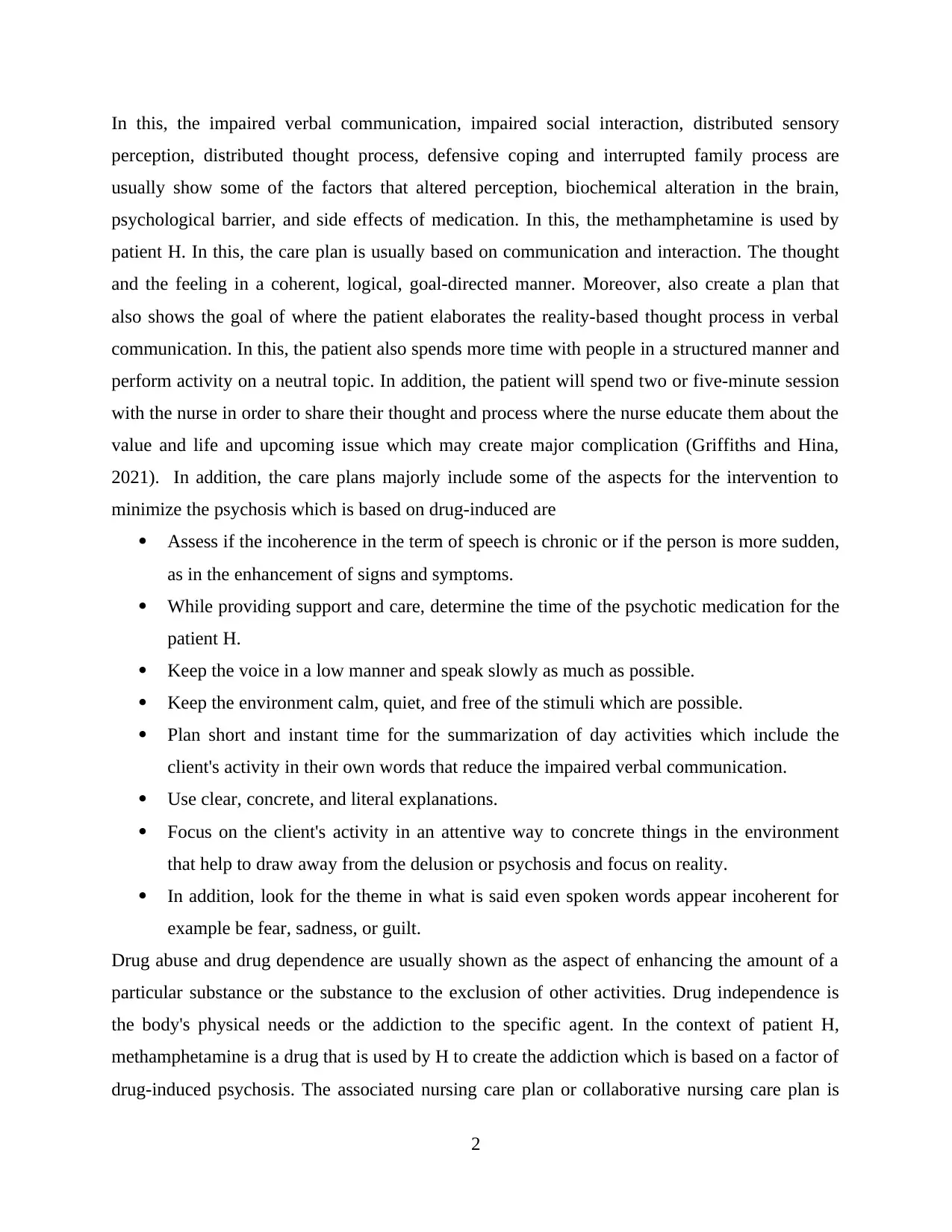
In this, the impaired verbal communication, impaired social interaction, distributed sensory
perception, distributed thought process, defensive coping and interrupted family process are
usually show some of the factors that altered perception, biochemical alteration in the brain,
psychological barrier, and side effects of medication. In this, the methamphetamine is used by
patient H. In this, the care plan is usually based on communication and interaction. The thought
and the feeling in a coherent, logical, goal-directed manner. Moreover, also create a plan that
also shows the goal of where the patient elaborates the reality-based thought process in verbal
communication. In this, the patient also spends more time with people in a structured manner and
perform activity on a neutral topic. In addition, the patient will spend two or five-minute session
with the nurse in order to share their thought and process where the nurse educate them about the
value and life and upcoming issue which may create major complication (Griffiths and Hina,
2021). In addition, the care plans majorly include some of the aspects for the intervention to
minimize the psychosis which is based on drug-induced are
Assess if the incoherence in the term of speech is chronic or if the person is more sudden,
as in the enhancement of signs and symptoms.
While providing support and care, determine the time of the psychotic medication for the
patient H.
Keep the voice in a low manner and speak slowly as much as possible.
Keep the environment calm, quiet, and free of the stimuli which are possible.
Plan short and instant time for the summarization of day activities which include the
client's activity in their own words that reduce the impaired verbal communication.
Use clear, concrete, and literal explanations.
Focus on the client's activity in an attentive way to concrete things in the environment
that help to draw away from the delusion or psychosis and focus on reality.
In addition, look for the theme in what is said even spoken words appear incoherent for
example be fear, sadness, or guilt.
Drug abuse and drug dependence are usually shown as the aspect of enhancing the amount of a
particular substance or the substance to the exclusion of other activities. Drug independence is
the body's physical needs or the addiction to the specific agent. In the context of patient H,
methamphetamine is a drug that is used by H to create the addiction which is based on a factor of
drug-induced psychosis. The associated nursing care plan or collaborative nursing care plan is
2
perception, distributed thought process, defensive coping and interrupted family process are
usually show some of the factors that altered perception, biochemical alteration in the brain,
psychological barrier, and side effects of medication. In this, the methamphetamine is used by
patient H. In this, the care plan is usually based on communication and interaction. The thought
and the feeling in a coherent, logical, goal-directed manner. Moreover, also create a plan that
also shows the goal of where the patient elaborates the reality-based thought process in verbal
communication. In this, the patient also spends more time with people in a structured manner and
perform activity on a neutral topic. In addition, the patient will spend two or five-minute session
with the nurse in order to share their thought and process where the nurse educate them about the
value and life and upcoming issue which may create major complication (Griffiths and Hina,
2021). In addition, the care plans majorly include some of the aspects for the intervention to
minimize the psychosis which is based on drug-induced are
Assess if the incoherence in the term of speech is chronic or if the person is more sudden,
as in the enhancement of signs and symptoms.
While providing support and care, determine the time of the psychotic medication for the
patient H.
Keep the voice in a low manner and speak slowly as much as possible.
Keep the environment calm, quiet, and free of the stimuli which are possible.
Plan short and instant time for the summarization of day activities which include the
client's activity in their own words that reduce the impaired verbal communication.
Use clear, concrete, and literal explanations.
Focus on the client's activity in an attentive way to concrete things in the environment
that help to draw away from the delusion or psychosis and focus on reality.
In addition, look for the theme in what is said even spoken words appear incoherent for
example be fear, sadness, or guilt.
Drug abuse and drug dependence are usually shown as the aspect of enhancing the amount of a
particular substance or the substance to the exclusion of other activities. Drug independence is
the body's physical needs or the addiction to the specific agent. In the context of patient H,
methamphetamine is a drug that is used by H to create the addiction which is based on a factor of
drug-induced psychosis. The associated nursing care plan or collaborative nursing care plan is
2
Paraphrase This Document
Need a fresh take? Get an instant paraphrase of this document with our AI Paraphraser
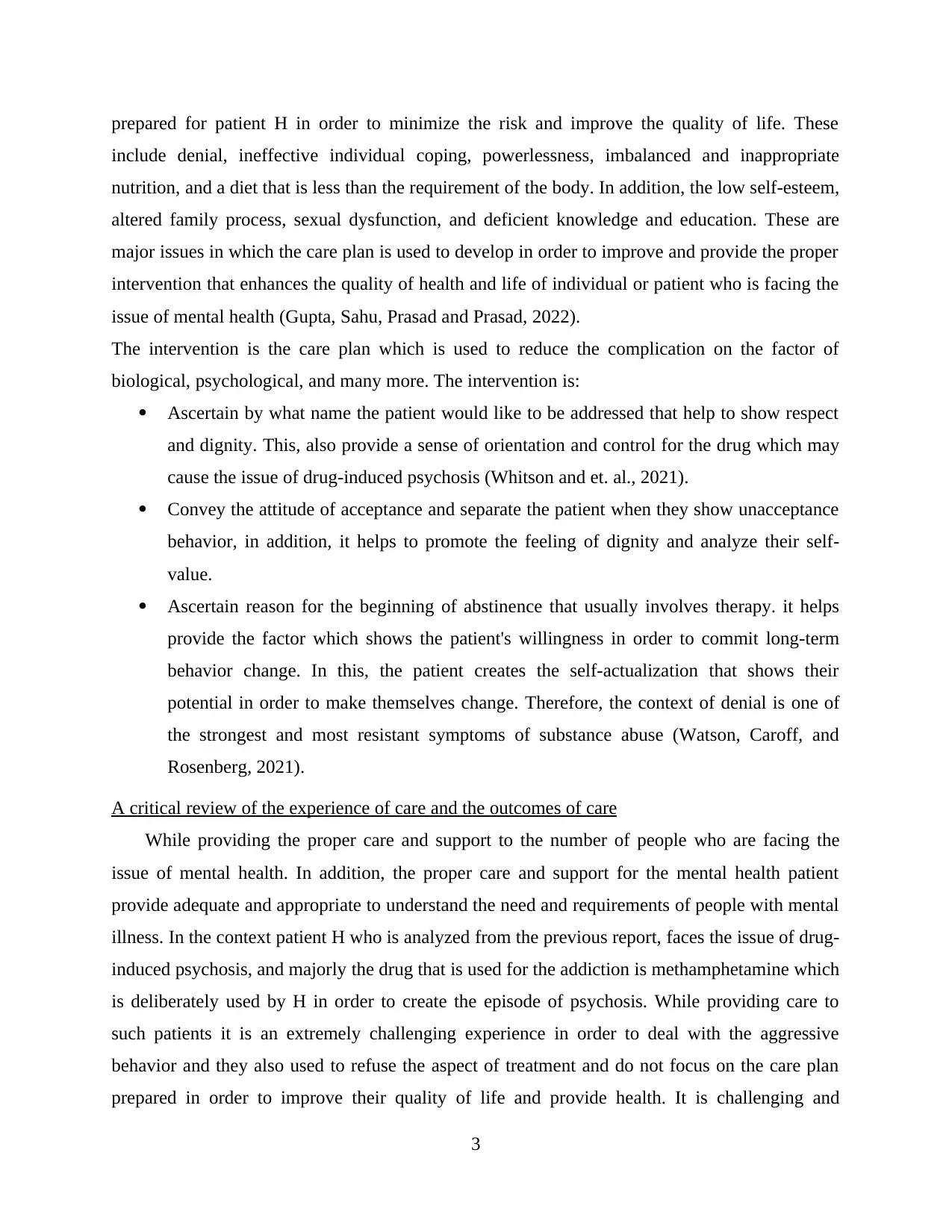
prepared for patient H in order to minimize the risk and improve the quality of life. These
include denial, ineffective individual coping, powerlessness, imbalanced and inappropriate
nutrition, and a diet that is less than the requirement of the body. In addition, the low self-esteem,
altered family process, sexual dysfunction, and deficient knowledge and education. These are
major issues in which the care plan is used to develop in order to improve and provide the proper
intervention that enhances the quality of health and life of individual or patient who is facing the
issue of mental health (Gupta, Sahu, Prasad and Prasad, 2022).
The intervention is the care plan which is used to reduce the complication on the factor of
biological, psychological, and many more. The intervention is:
Ascertain by what name the patient would like to be addressed that help to show respect
and dignity. This, also provide a sense of orientation and control for the drug which may
cause the issue of drug-induced psychosis (Whitson and et. al., 2021).
Convey the attitude of acceptance and separate the patient when they show unacceptance
behavior, in addition, it helps to promote the feeling of dignity and analyze their self-
value.
Ascertain reason for the beginning of abstinence that usually involves therapy. it helps
provide the factor which shows the patient's willingness in order to commit long-term
behavior change. In this, the patient creates the self-actualization that shows their
potential in order to make themselves change. Therefore, the context of denial is one of
the strongest and most resistant symptoms of substance abuse (Watson, Caroff, and
Rosenberg, 2021).
A critical review of the experience of care and the outcomes of care
While providing the proper care and support to the number of people who are facing the
issue of mental health. In addition, the proper care and support for the mental health patient
provide adequate and appropriate to understand the need and requirements of people with mental
illness. In the context patient H who is analyzed from the previous report, faces the issue of drug-
induced psychosis, and majorly the drug that is used for the addiction is methamphetamine which
is deliberately used by H in order to create the episode of psychosis. While providing care to
such patients it is an extremely challenging experience in order to deal with the aggressive
behavior and they also used to refuse the aspect of treatment and do not focus on the care plan
prepared in order to improve their quality of life and provide health. It is challenging and
3
include denial, ineffective individual coping, powerlessness, imbalanced and inappropriate
nutrition, and a diet that is less than the requirement of the body. In addition, the low self-esteem,
altered family process, sexual dysfunction, and deficient knowledge and education. These are
major issues in which the care plan is used to develop in order to improve and provide the proper
intervention that enhances the quality of health and life of individual or patient who is facing the
issue of mental health (Gupta, Sahu, Prasad and Prasad, 2022).
The intervention is the care plan which is used to reduce the complication on the factor of
biological, psychological, and many more. The intervention is:
Ascertain by what name the patient would like to be addressed that help to show respect
and dignity. This, also provide a sense of orientation and control for the drug which may
cause the issue of drug-induced psychosis (Whitson and et. al., 2021).
Convey the attitude of acceptance and separate the patient when they show unacceptance
behavior, in addition, it helps to promote the feeling of dignity and analyze their self-
value.
Ascertain reason for the beginning of abstinence that usually involves therapy. it helps
provide the factor which shows the patient's willingness in order to commit long-term
behavior change. In this, the patient creates the self-actualization that shows their
potential in order to make themselves change. Therefore, the context of denial is one of
the strongest and most resistant symptoms of substance abuse (Watson, Caroff, and
Rosenberg, 2021).
A critical review of the experience of care and the outcomes of care
While providing the proper care and support to the number of people who are facing the
issue of mental health. In addition, the proper care and support for the mental health patient
provide adequate and appropriate to understand the need and requirements of people with mental
illness. In the context patient H who is analyzed from the previous report, faces the issue of drug-
induced psychosis, and majorly the drug that is used for the addiction is methamphetamine which
is deliberately used by H in order to create the episode of psychosis. While providing care to
such patients it is an extremely challenging experience in order to deal with the aggressive
behavior and they also used to refuse the aspect of treatment and do not focus on the care plan
prepared in order to improve their quality of life and provide health. It is challenging and
3
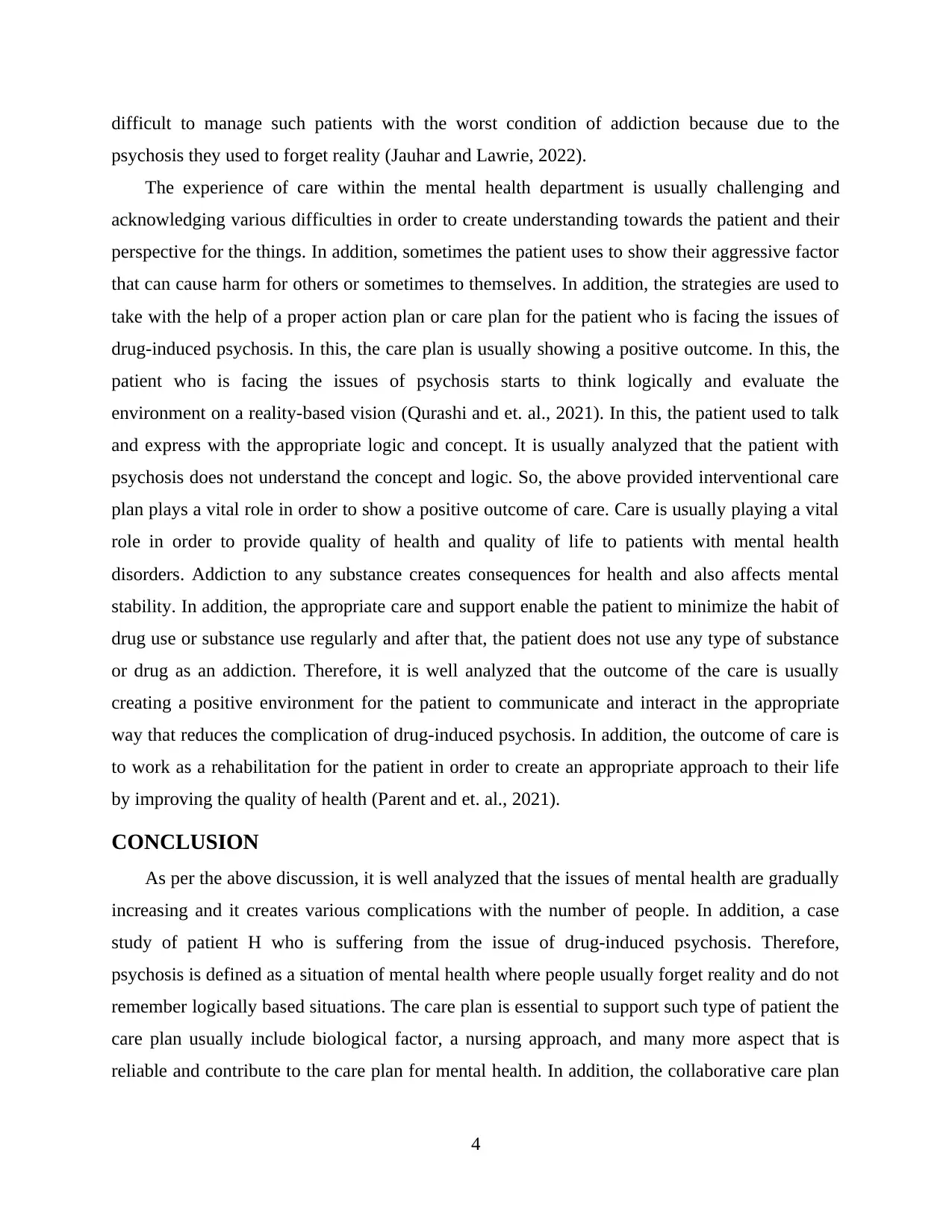
difficult to manage such patients with the worst condition of addiction because due to the
psychosis they used to forget reality (Jauhar and Lawrie, 2022).
The experience of care within the mental health department is usually challenging and
acknowledging various difficulties in order to create understanding towards the patient and their
perspective for the things. In addition, sometimes the patient uses to show their aggressive factor
that can cause harm for others or sometimes to themselves. In addition, the strategies are used to
take with the help of a proper action plan or care plan for the patient who is facing the issues of
drug-induced psychosis. In this, the care plan is usually showing a positive outcome. In this, the
patient who is facing the issues of psychosis starts to think logically and evaluate the
environment on a reality-based vision (Qurashi and et. al., 2021). In this, the patient used to talk
and express with the appropriate logic and concept. It is usually analyzed that the patient with
psychosis does not understand the concept and logic. So, the above provided interventional care
plan plays a vital role in order to show a positive outcome of care. Care is usually playing a vital
role in order to provide quality of health and quality of life to patients with mental health
disorders. Addiction to any substance creates consequences for health and also affects mental
stability. In addition, the appropriate care and support enable the patient to minimize the habit of
drug use or substance use regularly and after that, the patient does not use any type of substance
or drug as an addiction. Therefore, it is well analyzed that the outcome of the care is usually
creating a positive environment for the patient to communicate and interact in the appropriate
way that reduces the complication of drug-induced psychosis. In addition, the outcome of care is
to work as a rehabilitation for the patient in order to create an appropriate approach to their life
by improving the quality of health (Parent and et. al., 2021).
CONCLUSION
As per the above discussion, it is well analyzed that the issues of mental health are gradually
increasing and it creates various complications with the number of people. In addition, a case
study of patient H who is suffering from the issue of drug-induced psychosis. Therefore,
psychosis is defined as a situation of mental health where people usually forget reality and do not
remember logically based situations. The care plan is essential to support such type of patient the
care plan usually include biological factor, a nursing approach, and many more aspect that is
reliable and contribute to the care plan for mental health. In addition, the collaborative care plan
4
psychosis they used to forget reality (Jauhar and Lawrie, 2022).
The experience of care within the mental health department is usually challenging and
acknowledging various difficulties in order to create understanding towards the patient and their
perspective for the things. In addition, sometimes the patient uses to show their aggressive factor
that can cause harm for others or sometimes to themselves. In addition, the strategies are used to
take with the help of a proper action plan or care plan for the patient who is facing the issues of
drug-induced psychosis. In this, the care plan is usually showing a positive outcome. In this, the
patient who is facing the issues of psychosis starts to think logically and evaluate the
environment on a reality-based vision (Qurashi and et. al., 2021). In this, the patient used to talk
and express with the appropriate logic and concept. It is usually analyzed that the patient with
psychosis does not understand the concept and logic. So, the above provided interventional care
plan plays a vital role in order to show a positive outcome of care. Care is usually playing a vital
role in order to provide quality of health and quality of life to patients with mental health
disorders. Addiction to any substance creates consequences for health and also affects mental
stability. In addition, the appropriate care and support enable the patient to minimize the habit of
drug use or substance use regularly and after that, the patient does not use any type of substance
or drug as an addiction. Therefore, it is well analyzed that the outcome of the care is usually
creating a positive environment for the patient to communicate and interact in the appropriate
way that reduces the complication of drug-induced psychosis. In addition, the outcome of care is
to work as a rehabilitation for the patient in order to create an appropriate approach to their life
by improving the quality of health (Parent and et. al., 2021).
CONCLUSION
As per the above discussion, it is well analyzed that the issues of mental health are gradually
increasing and it creates various complications with the number of people. In addition, a case
study of patient H who is suffering from the issue of drug-induced psychosis. Therefore,
psychosis is defined as a situation of mental health where people usually forget reality and do not
remember logically based situations. The care plan is essential to support such type of patient the
care plan usually include biological factor, a nursing approach, and many more aspect that is
reliable and contribute to the care plan for mental health. In addition, the collaborative care plan
4
⊘ This is a preview!⊘
Do you want full access?
Subscribe today to unlock all pages.

Trusted by 1+ million students worldwide
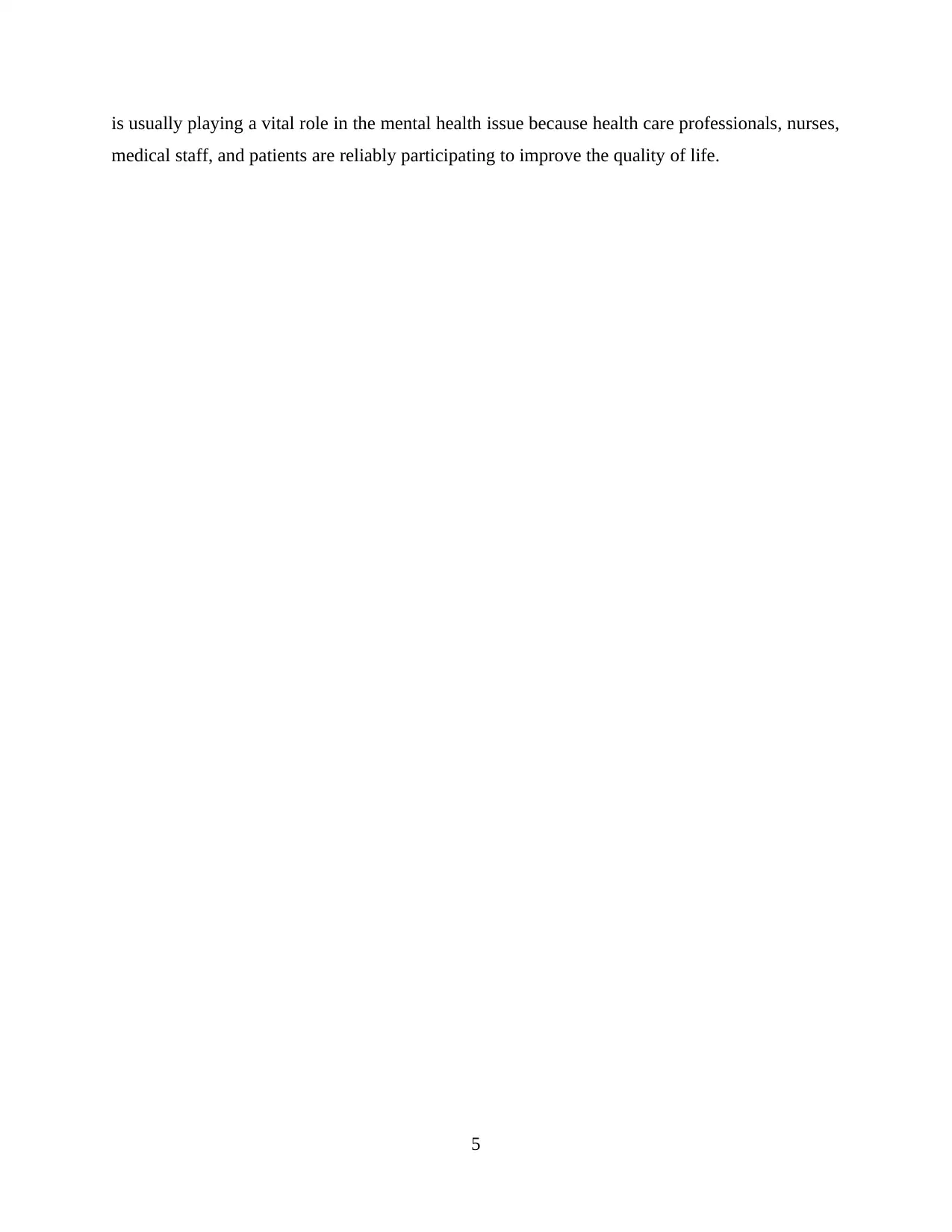
is usually playing a vital role in the mental health issue because health care professionals, nurses,
medical staff, and patients are reliably participating to improve the quality of life.
5
medical staff, and patients are reliably participating to improve the quality of life.
5
Paraphrase This Document
Need a fresh take? Get an instant paraphrase of this document with our AI Paraphraser
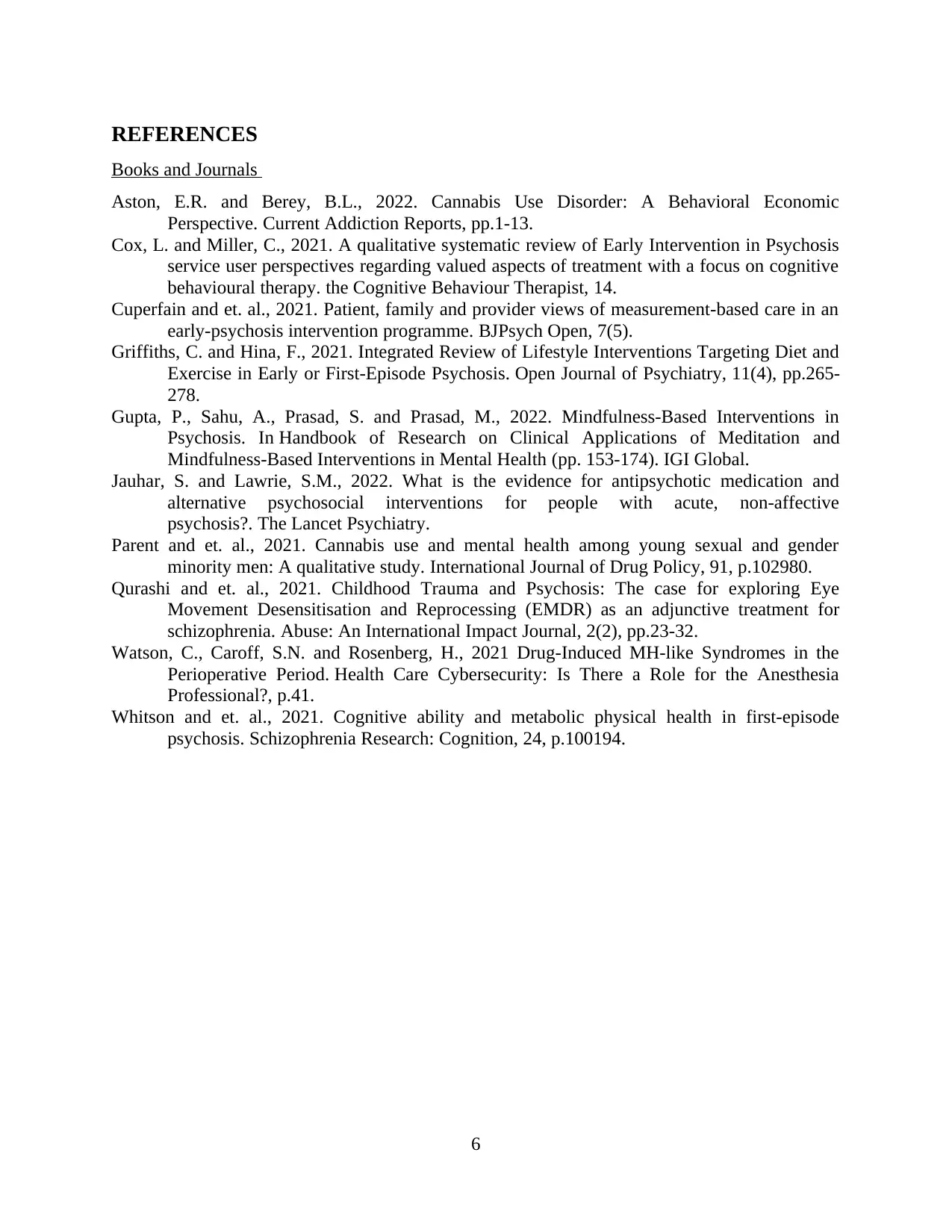
REFERENCES
Books and Journals
Aston, E.R. and Berey, B.L., 2022. Cannabis Use Disorder: A Behavioral Economic
Perspective. Current Addiction Reports, pp.1-13.
Cox, L. and Miller, C., 2021. A qualitative systematic review of Early Intervention in Psychosis
service user perspectives regarding valued aspects of treatment with a focus on cognitive
behavioural therapy. the Cognitive Behaviour Therapist, 14.
Cuperfain and et. al., 2021. Patient, family and provider views of measurement-based care in an
early-psychosis intervention programme. BJPsych Open, 7(5).
Griffiths, C. and Hina, F., 2021. Integrated Review of Lifestyle Interventions Targeting Diet and
Exercise in Early or First-Episode Psychosis. Open Journal of Psychiatry, 11(4), pp.265-
278.
Gupta, P., Sahu, A., Prasad, S. and Prasad, M., 2022. Mindfulness-Based Interventions in
Psychosis. In Handbook of Research on Clinical Applications of Meditation and
Mindfulness-Based Interventions in Mental Health (pp. 153-174). IGI Global.
Jauhar, S. and Lawrie, S.M., 2022. What is the evidence for antipsychotic medication and
alternative psychosocial interventions for people with acute, non-affective
psychosis?. The Lancet Psychiatry.
Parent and et. al., 2021. Cannabis use and mental health among young sexual and gender
minority men: A qualitative study. International Journal of Drug Policy, 91, p.102980.
Qurashi and et. al., 2021. Childhood Trauma and Psychosis: The case for exploring Eye
Movement Desensitisation and Reprocessing (EMDR) as an adjunctive treatment for
schizophrenia. Abuse: An International Impact Journal, 2(2), pp.23-32.
Watson, C., Caroff, S.N. and Rosenberg, H., 2021 Drug-Induced MH-like Syndromes in the
Perioperative Period. Health Care Cybersecurity: Is There a Role for the Anesthesia
Professional?, p.41.
Whitson and et. al., 2021. Cognitive ability and metabolic physical health in first-episode
psychosis. Schizophrenia Research: Cognition, 24, p.100194.
6
Books and Journals
Aston, E.R. and Berey, B.L., 2022. Cannabis Use Disorder: A Behavioral Economic
Perspective. Current Addiction Reports, pp.1-13.
Cox, L. and Miller, C., 2021. A qualitative systematic review of Early Intervention in Psychosis
service user perspectives regarding valued aspects of treatment with a focus on cognitive
behavioural therapy. the Cognitive Behaviour Therapist, 14.
Cuperfain and et. al., 2021. Patient, family and provider views of measurement-based care in an
early-psychosis intervention programme. BJPsych Open, 7(5).
Griffiths, C. and Hina, F., 2021. Integrated Review of Lifestyle Interventions Targeting Diet and
Exercise in Early or First-Episode Psychosis. Open Journal of Psychiatry, 11(4), pp.265-
278.
Gupta, P., Sahu, A., Prasad, S. and Prasad, M., 2022. Mindfulness-Based Interventions in
Psychosis. In Handbook of Research on Clinical Applications of Meditation and
Mindfulness-Based Interventions in Mental Health (pp. 153-174). IGI Global.
Jauhar, S. and Lawrie, S.M., 2022. What is the evidence for antipsychotic medication and
alternative psychosocial interventions for people with acute, non-affective
psychosis?. The Lancet Psychiatry.
Parent and et. al., 2021. Cannabis use and mental health among young sexual and gender
minority men: A qualitative study. International Journal of Drug Policy, 91, p.102980.
Qurashi and et. al., 2021. Childhood Trauma and Psychosis: The case for exploring Eye
Movement Desensitisation and Reprocessing (EMDR) as an adjunctive treatment for
schizophrenia. Abuse: An International Impact Journal, 2(2), pp.23-32.
Watson, C., Caroff, S.N. and Rosenberg, H., 2021 Drug-Induced MH-like Syndromes in the
Perioperative Period. Health Care Cybersecurity: Is There a Role for the Anesthesia
Professional?, p.41.
Whitson and et. al., 2021. Cognitive ability and metabolic physical health in first-episode
psychosis. Schizophrenia Research: Cognition, 24, p.100194.
6
1 out of 8
Related Documents
Your All-in-One AI-Powered Toolkit for Academic Success.
+13062052269
info@desklib.com
Available 24*7 on WhatsApp / Email
![[object Object]](/_next/static/media/star-bottom.7253800d.svg)
Unlock your academic potential
Copyright © 2020–2026 A2Z Services. All Rights Reserved. Developed and managed by ZUCOL.





